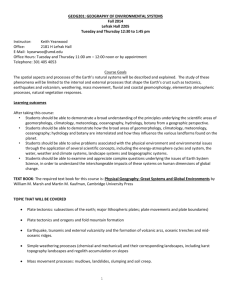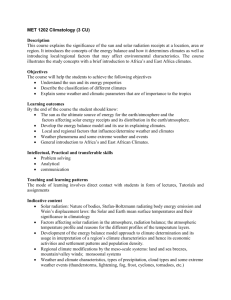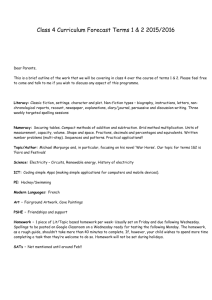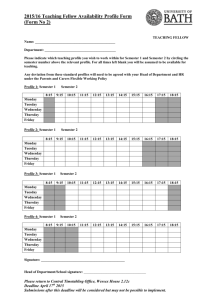Syllabus - University of Maryland
advertisement
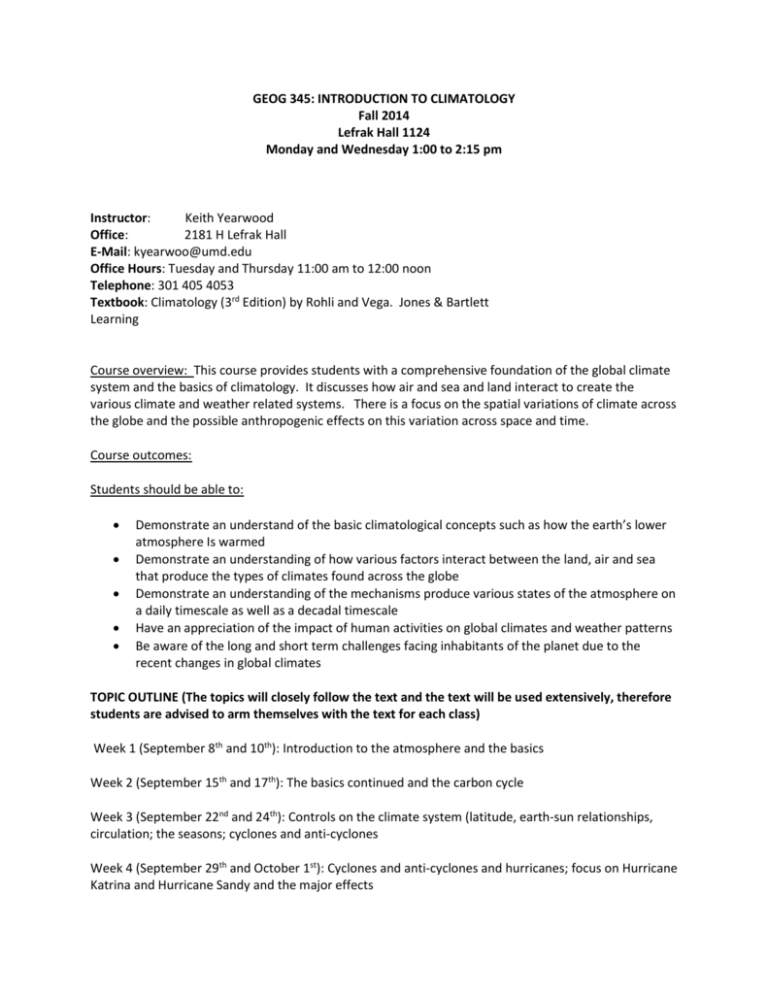
GEOG 345: INTRODUCTION TO CLIMATOLOGY Fall 2014 Lefrak Hall 1124 Monday and Wednesday 1:00 to 2:15 pm Instructor: Keith Yearwood Office: 2181 H Lefrak Hall E-Mail: kyearwoo@umd.edu Office Hours: Tuesday and Thursday 11:00 am to 12:00 noon Telephone: 301 405 4053 Textbook: Climatology (3rd Edition) by Rohli and Vega. Jones & Bartlett Learning Course overview: This course provides students with a comprehensive foundation of the global climate system and the basics of climatology. It discusses how air and sea and land interact to create the various climate and weather related systems. There is a focus on the spatial variations of climate across the globe and the possible anthropogenic effects on this variation across space and time. Course outcomes: Students should be able to: Demonstrate an understand of the basic climatological concepts such as how the earth’s lower atmosphere Is warmed Demonstrate an understanding of how various factors interact between the land, air and sea that produce the types of climates found across the globe Demonstrate an understanding of the mechanisms produce various states of the atmosphere on a daily timescale as well as a decadal timescale Have an appreciation of the impact of human activities on global climates and weather patterns Be aware of the long and short term challenges facing inhabitants of the planet due to the recent changes in global climates TOPIC OUTLINE (The topics will closely follow the text and the text will be used extensively, therefore students are advised to arm themselves with the text for each class) Week 1 (September 8th and 10th): Introduction to the atmosphere and the basics Week 2 (September 15th and 17th): The basics continued and the carbon cycle Week 3 (September 22nd and 24th): Controls on the climate system (latitude, earth-sun relationships, circulation; the seasons; cyclones and anti-cyclones Week 4 (September 29th and October 1st): Cyclones and anti-cyclones and hurricanes; focus on Hurricane Katrina and Hurricane Sandy and the major effects Week 5 (October 6th and October 8th): Atmospheric interactions with the other “spheres” (oceanic circulations, ENSO events. Week 7 (October 20th and October 22nd): Volcanic activity and climate; deforestation and desertification Week 8 (October 27th and October 29th) Global warming and its effects on climates Week 9 (November 3rd and November 5th) Cyrospheric changes (ice on the earth’s surface and the relationship to global warming Week 10 (November 10th and November 12th): Coasts in peril: effects of sea level rise and coastal environmental response; policy changes in response to sea level rise Week 11 (November 17th and November 19th): Hydrologic cycle and water surface balance (evapotranspiration, precipitation and clouds, types of rainfall Week 12 (November 24th and November 26th): General circulation and secondary circulation (the idealized general circulation on a rotating planet). Week 13 (December 1st and December 3rd ): Hadley cells, polar cells, planetary wind system and the ITCZ and introduction to climate classification Week 14 (December 8th and December 10th): Open and Multiple-choice exam review Email: Please if you send an email to the Instructor regarding GEOG 345 please put in the subject GEOG 345 for a quicker response. Students with special needs - I will make every effort to accommodate students who are registered with the Disability Support Services (DSS) Office and who provide me with a University of Maryland DSS Accommodation form which has been updated for the Fall semester. This form must be presented to me no later than September 30th. I am not able to accommodate students who are not registered with DSS or who do not provide me with documentation which has been reviewed by DSS after September 30th Disruptive Students: Students are expected to treat each other with respect. Disruptive behavior of any kind will not be tolerated. Students who are unable to show civility with one another, the teaching assistants, or myself will be subject to being referred to the Office of Student Conduct or to Campus Police. You are expected to adhere to the Code of Student Conduct.” Religious Observance: By September 30th, students must provide via email a request for a make up exam if I have indicated a date on this syllabus that you are unable to make due to a specific religious observance (specify) on a specific date. Please refer to the Online Undergraduate Catalog Policy on Religious Observance. Attendance: Attendance is strongly advised at the lecture since questions on the exams will come from lecture material, documentaries, and the text book. Campus Senate policy requires students who are absent due to illness/injury to furnish documentary support to the instructor. I require students to contact me by email or by phone prior to class time in which you indicate that you have an illness or an injury. You must provide written documentation verifying your illness/injury immediately upon your return to class. You will not be allowed to turn in/complete missed exams or papers, etc. if you have not provided this documentation. Documentation not presented to me in a timely manner will not be accepted. In addition, if it is found that you have falsified the documentation provided, I will refer you to the University’s Student Conduct Office. Grading: Students will be graded in the following FOUR areas: Semester paper – 20 % Multiple choice closed book exam – 40 % Open book exam 1 – 15 % Open book exam 2 – 25 % Final letter grades will be broken down the following way: 96 – 100 92 – 95 90 – 91 88 – 89 82 – 87 80 – 81 78 – 79 72 – 77 70 – 71 60 – 69 Less than 60 A+ A AB+ B BC+ C CD F Important dates and deadlines Open Book Exam One will be given on Wednesday 1st October Open Book Exam Two will be given on Wednesday 29th October Paper topics for semester paper will be finalized on Wednesday 5th November Semester papers due on Wednesday 19th November Wednesday 10th December: Multiple choice exam review EXAM date (Multiple-choice) to be announced when it is made available The penalty for late submission of papers is the loss of points. An assignment is late if it has been submitted after the end of the class period on the day it is due. All semester papers to be submitted MUST be printed. No emailed work will be accepted. A note on querying exam scores/assignments: Students are free to query their exam scores under the following conditions: You cannot query scores from a previous exam after a second exam is given, etc. Your window of opportunity therefore lasts from the end of the exam until the time the next one is given. Academic integrity: Academic dishonesty is a serious offence that can result in suspension or expulsion from the University of Maryland. All assignments should be your own work. Since there are several writing assignments, plagiarism would not be tolerated. Please refer to the following website to determine how the University of Maryland defines plagiarism: http://www.testudo.umd.edu/soc/dishonesty.html. Final letter grades will be broken down the following way: 96 – 100 A+ 92 – 95 A 90 – 91 A- 88 – 89 B+ 82 – 87 B 80 – 81 B- 78 – 79 C+ 72 – 77 C 70 – 71 C- 60 – 69 D Less than 60 F PLEASE BE ADVISED THAT THE MATERIAL OUTLINED IN THE SYLLABUS, INCLUDING DATES FOR EXAMS ARE SUBJECT TO CHANGE IN ACCORDANCE WITH THE OCCURRENCE OF SPECIAL CASES AND EVENTS.

